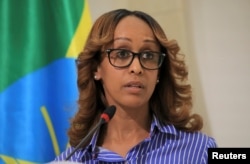June 18 marks seven months in prison for Dessu Dulla. The Ethiopian journalist from the Oromia News Network, or ONN, is accused of anti-state activities. If convicted, he could face life in prison, or even the death penalty.
It's a sharp turn of events for Dessu, who returned from exile in Europe in 2018, drawn by what seemed at the time like a period of reform.
He started work at ONN, where he hosted the weekly show "Under the Shadow of Democracy," looking at threats in Ethiopia and its Oromia region.
"I thought it would be another era and that democracy and freedom of speech may be restored," Dessu told Reuters before his arrest last November. But "actually things are deteriorating. So many journalists have fled the country, and some are in jail."
Dessu is one of more than 20 journalists currently held in Ethiopian prisons. Most had reported on the conflicts in Ethiopia's Tigray, Oromia and Amhara regions.
Alongside arrests, Ethiopia's media regulator in April announced it was taking legal action against 25 media outlets that it said were spreading false news and hate speech.
Authorities say their actions are designed to stop the spread of disinformation or anti-state activities. But rights groups and journalists say Ethiopia is using legal avenues to silence critics or dissidents.
Tsedale Lemma, who founded the newspaper Addis Standard, said the arrests of journalists, many of whom were pro-government during the war in Tigray, send a broader message to media across the country.
"It's the effect that is really reverberating across media rooms in Ethiopia," Tsedale said, adding that it creates challenges "because you wouldn't know what is it going to be that the government is turning against this time."
WATCH: Ethiopia Intensifies Crackdown on Journalists
In Dessu's case, he and his ONN colleague Bikila Amenu are included in a case that includes 15 members and supporters of the Oromo Liberation Front (OLF) political party, who are accused of plotting to overthrow the government.
A court in April charged the journalists under a law barring "outrages against the constitution."
Authorities say the journalists' news coverage was sympathetic to the OLF.
Their lawyer, Milkiyas Bulcha, told VOA Amharic Service that Dessu and the others have not been given a fair chance to defend themselves.
"The prosecutor is narrowing the right of the accused to defend themselves, and they are not meeting the standards required by law," he said.
Because of that, said Milkiyas, "They should be released from prison without any preconditions."
Legal landscape
Advocacy groups say the use of anti-terror and other laws to silence the media and political dissidents must end if Prime Minister Abiy Ahmed is going to live up to the promises he made when taking power in 2018.
"It's simple, really," Angela Quintal, Africa program coordinator for the Committee to Protect Journalists, told VOA. She said CPJ wants the release of "all journalists currently behind bars in Ethiopia and for the government to end its persecution of the independent press.”
But Ethiopian authorities say they are trying to tackle disinformation and prevent polarization or ethnic division.
When Billene Seyoum, a spokesperson for the prime minister's office, referenced outcry over the recent spate of arrests during a June 6 press briefing, she said, "It's really important to unpack who is a journalist and who is not."
As far as the media authority is aware, she said, "many of these that are going under the banner of journalists are not accredited or not licensed."
The spokesperson said strong laws curbing hate speech and disinformation are needed to regulate or control the growth of explosive rhetoric, particularly online.
It is "problematic," Billene said, "if everybody with a YouTube channel is considered a journalist and there is no means of regulating what is said."
Quintal, however, said legal action against the media is taking the country down a dark path.
"It is shocking that Ethiopia is once again among the worst jailers of journalists in Africa and where due process and the rule of law has been violated time and time again," she told VOA.
"Prime Minister Ahmed Abiy's government can still live up to his promise of reform when he first came into office by reversing the worrying decline in press freedom that we have witnessed, particularly since the war in Tigray started," Quintal said.
Abiy was hailed in 2018 for his progressive moves, including the release of all jailed journalists and the restoration of access to blocked news websites.
In 2019, the United Nations held its press freedom conference in the capital, Addis Ababa, to commemorate World Press Freedom Day. Abiy was awarded the Nobel Peace Prize that same year.
But by 2021, with the war in Tigray underway, Abiy has signaled less tolerance for reporting that is critical or challenges government actions, and which authorities equate to false or biased news.
In a speech to lawmakers on Tuesday, Abiy said, "Let's not designate individuals engaged in destroying national institutions as 'activists' and 'journalists.' "
Media watchdog Reporters Without Borders (RSF) notes that conflict has wiped out most of the press freedom gains made by Ethiopia in recent years.
"Since the start of the civil war, the government has made a determined effort to take control of the narrative," according to RSF. The watchdog ranks Ethiopia 114th out of 180 countries, where 1 is freest, on its annual Press Freedom Index.
VOA English to Africa Service's Vincent Makori and VOA Horn of Africa's Amharic Service reporter Nakor Melka contributed to this report.







